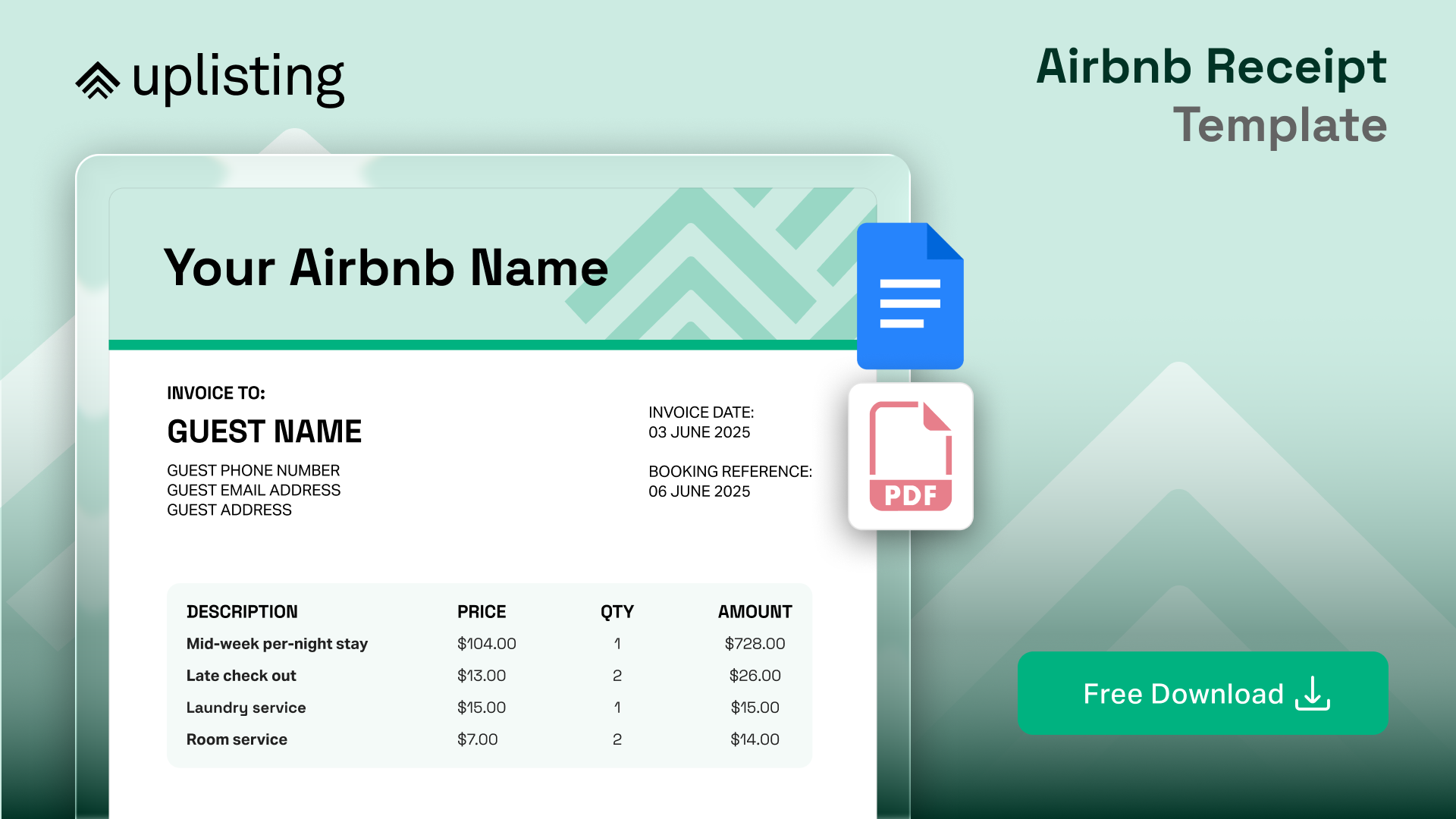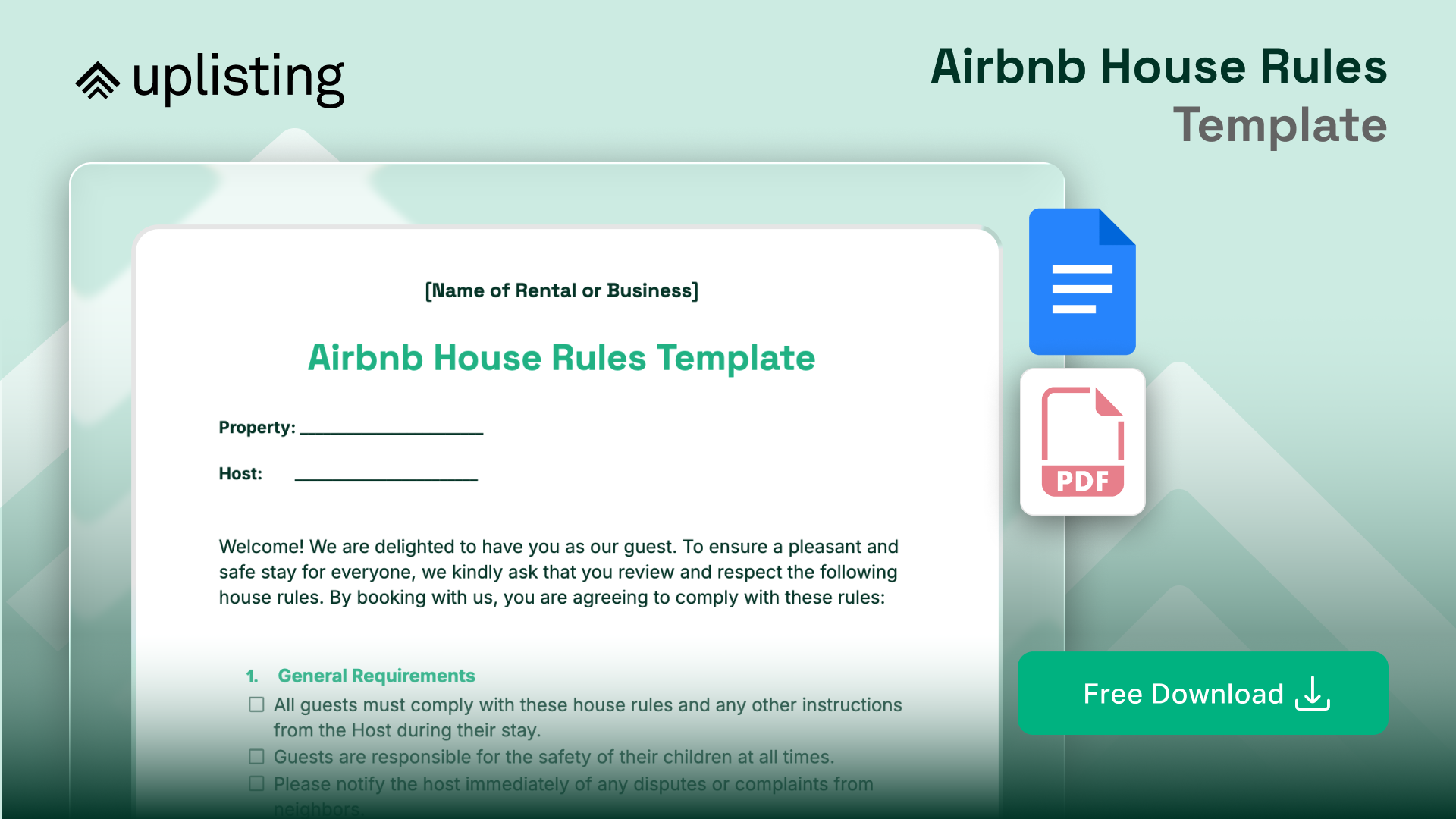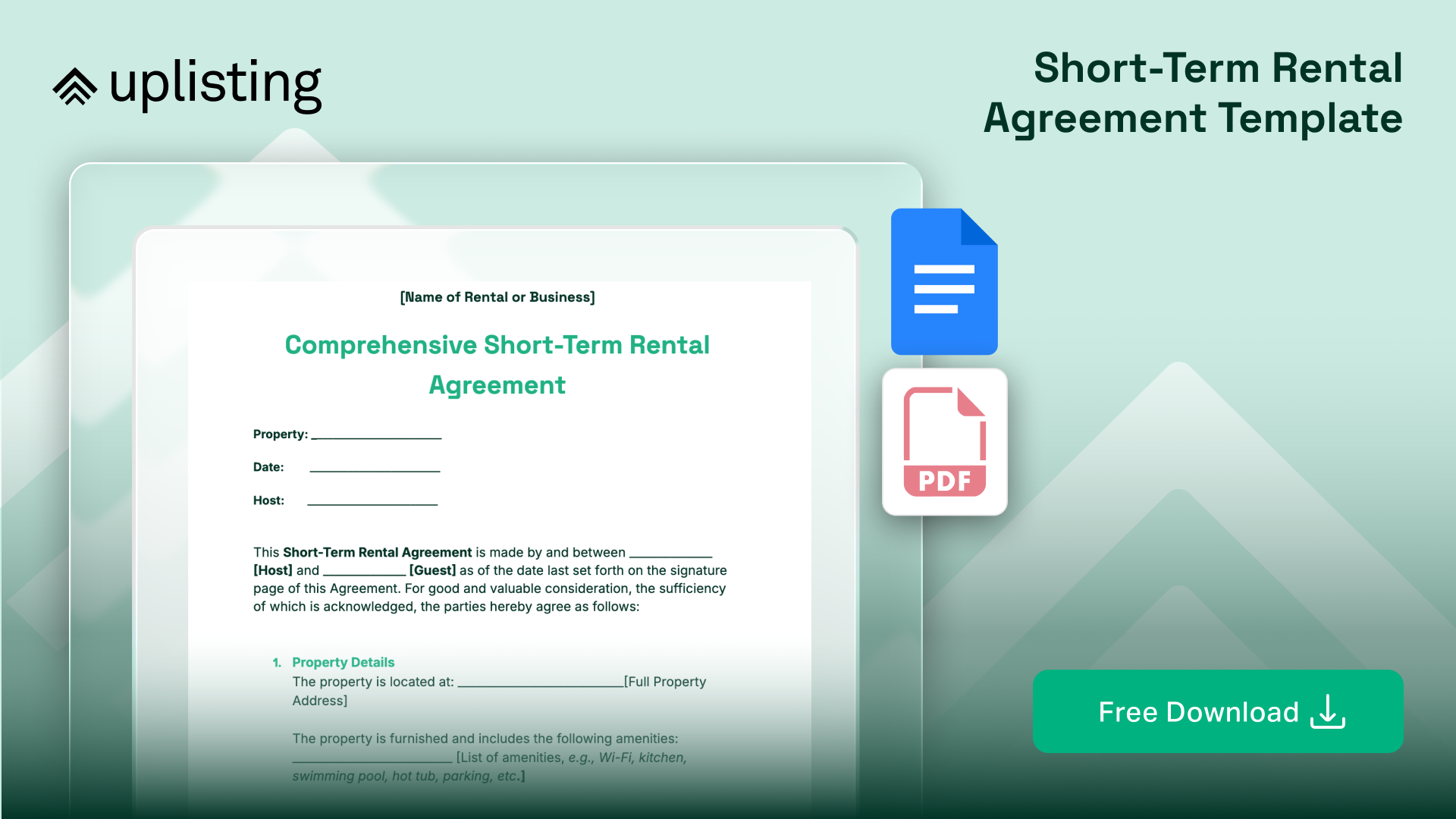Key Takeaways
Airbnb attracts more spontaneous bookings and urban travelers, while Vrbo excels with families and longer stays in traditional vacation markets.
Vrbo offers more control over pricing and calendars, while Airbnb provides broader visibility and a smoother guest interface.
Diversifying across both platforms helps reduce risk, increase occupancy, and optimize revenue in competitive short-term rental markets.
Scaling your short-term rental (STR) business requires choosing sides (or playing for both teams) in the eternal battle between booking titans. Airbnb and Vrbo stand like mortal enemies on the STR battlefield, each commanding loyal armies of travelers while vying for the other's territory. Despite their rivalry, these platforms serve distinctly different audiences and offer differing host experiences.
For property managers handling multiple listings, understanding how each channel fits into your portfolio strategy is essential for survival on the STR battlefield. The right platform mix can help you reduce cancellations, capture ideal guests, and maintain optimal occupancy through all seasons. This isn't about pledging allegiance to either Airbnb or Vrbo; it's about strategically deploying each platform's strengths to advance your business objectives.
Each platform brings advantages and trade-offs that impact everything from calendar control to guest expectations. To scale your vacation rental empire efficiently across this contested landscape, you need intimate knowledge of how these platforms operate, which territories they dominate, and how to leverage their competing strengths to your tactical advantage.
Reasons to Compare These Platforms For STR Success
"Is Vrbo better than Airbnb?" is a simple question that encompasses many different elements. Which one supports your revenue goals, guest expectations, and day-to-day operations without adding headaches?
When you're juggling multiple listings, every setting matters. Calendar rules, cancellation options, and guest service fees all shape your profit margins.
Pricing dynamics and platform fees
Fee structures directly shape profitability across multiple listings. Airbnb often adds higher service fees to guest bookings, which can make your nightly rate look inflated in search results. Vrbo usually shows lower guest fees, which helps your listing appear more competitive. Lower platform fees don't always mean less work, though. You might need to adjust your pricing strategy more often to hit revenue targets if your base rate is lower.
Cancellation flexibility also affects performance. Vrbo leans toward stricter policies, which helps reduce last-minute cancellations and protects your calendar. Airbnb guests expect more flexibility, especially those booking impulsively using Instant Book or traveling solo. If your properties rely on consistent occupancy and fast turnovers, cancellation rules can either streamline your schedule or create more unpredictability.
Guest demographics drive experience and wear
Guest behavior can vary widely between platforms because of the different types of guests that they attract, and that difference impacts everything from cleaning costs to reviews. While these are generalizations and individual guest behavior is more complex, Vrbo typically attracts advance planners—families, pet owners, and vacationers booking longer stays. These guests are generally more likely to follow house rules, book farther out, and leave properties in better shape. That consistency helps reduce wear and tear, especially when you manage multiple turnovers every week.
Airbnb tends to bring in younger, more urban guests who book short stays with little lead time. That crowd includes solo travelers, couples on weekend getaways, and digital nomads. The upside? More bookings. The downside? Higher turnover and more maintenance calls. Of course, actual guest behavior often depends on factors beyond the booking platform—like your property's proximity to nightlife, how you market your space, or why guests are visiting (business trips versus bachelor parties).If your listings are in city centers, these travelers can fill gaps between longer stays—but they also increase operational load.
Brand perception and platform behavior
How guests perceive each platform influences their expectations. Airbnb feels fast, flexible, and easy. The interface prioritizes convenience, and travelers expect smooth bookings, instant confirmations, and quick replies. That simplicity boosts conversions, but it also puts more pressure on hosts. Hosts face stricter timelines for resolving guest issues before they escalate to platform intervention and less control over how their listings appear in search results compared to Vrbo's more customizable approach.
Vrbo appeals to travelers looking for reliability. Longtime vacationers often see it as the go-to platform for annual family trips. That trust translates into longer bookings and higher nightly rates in legacy vacation markets. Hosts have more control over pricing rules, cancellation windows, and availability settings, which helps when syncing calendars across multiple channels.
Competitive pressure in saturated markets
In crowded regions, guest behavior shifts based on the booking platform. Vrbo performs well in beach towns, mountain areas, and lake communities. These are places where guests return every summer or plan trips far in advance. Airbnb captures demand in trend-driven cities, where travelers search for experiences and aesthetics more than zip codes.
Platform performance often varies within the same market. Two listings on the same block can see very different results depending on which site brings in more aligned guests. Operators who track booking patterns and adjust their channel strategies often get more consistent occupancy and fewer surprises.
All-in-one Vacation Rental Software and Channel Management System
Get started in seconds by connecting Airbnb
Manage short-term rentals & bookings, message guests, take payment, and so much more. All in one easy-to-use platform (that never double-books).
Vrbo vs. Airbnb: Side-By-Side Comparison
Managing multiple short-term rentals means every platform decision directly impacts your income, workflows, and guest experience. Airbnb and Vrbo aren’t interchangeable—they serve different types of guests, favor different types of listings, and offer different levels of control. If you're scaling across several markets, those differences matter.
Fee structure and net earnings
Margins tighten fast when you manage six or more properties, and platform fees can quietly eat into revenue. Airbnb usually charges hosts around 3% per booking, but guests often see service fees up to 14.2%. That can send your total price higher in search results, even if your base rate looks competitive. Dropping your nightly rate to stay visible often means taking the hit yourself.
Vrbo takes a different approach. Hosts typically pay 5% in commission plus another 3% for payment processing, or can opt for an annual subscription fee (around $699) that eliminates the per-booking commission. Guest fees are usually lower, which can make your listing look more affordable without you needing to discount. For higher-value bookings—like weeklong stays in leisure markets—Vrbo's structure often puts more money in your pocket. If you've been wondering "Is Vrbo better than Airbnb" from a net revenue perspective, the answer depends on how well you price around the fee model.
Target audience and booking patterns
Guest behavior shapes everything from cleaning schedules to review quality. Airbnb leans younger and faster. Travelers are often booking last-minute trips, quick getaways, or remote work stays. Stays are shorter, expectations are higher, and communication tends to be more frequent (and sometimes more demanding). The upside is volume, especially in urban markets.
Vrbo attracts planners. Families, pet owners, and multi-generational groups often book months in advance, stay longer, and use the whole property. If your portfolio includes larger homes, vacation cabins, or lakefront properties, Vrbo’s audience matches the booking patterns you want—fewer turnovers, longer stays, and fewer complaints about check-out times.
Property listings and platform flexibility
Airbnb supports a wide range of property types—from private rooms in shared homes to architect-designed treehouses. That flexibility works well in cities where space is tight and operators need to monetize creative layouts. Mixed inventory? Airbnb can handle it without making your listings look out of place.
Vrbo sticks to entire-home rentals. You won’t list a private bedroom or shared space there. That makes the platform a better fit for full-property stays, especially in vacation destinations where guests expect privacy and space. For operators managing upscale homes or properties with multiple bedrooms, Vrbo’s listing format keeps the competition limited to similar listings.
Owner control and booking policies
Airbnb leans toward guest-first policies. The platform limits how much you can screen guests, sets narrow cancellation windows, and often sides with travelers in disputes. That makes sense in fast-moving urban markets, but it can cause problems when you're managing high-value properties with tight cleaning schedules.
Vrbo gives hosts more options. You can require upfront deposits, adjust cancellation policies to suit your risk tolerance, and set custom booking rules. The calendar tools also offer more freedom, making it easier to coordinate across multiple platforms or adjust availability around maintenance and team schedules. For operators who prioritize control and consistency, Vrbo’s approach feels more hands-on, in a good way.

Pros and Cons for Entrepreneurs
Scaling a short-term rental portfolio means making choices that affect everything from day-to-day operations to long-term growth. Picking between Airbnb and Vrbo is about choosing tools that actually support how you run your business.
Each platform brings clear benefits and trade-offs. Some will help you reduce guest issues, while others offer more reach. What matters is knowing where each one fits into your strategy.
Vrbo advantages and drawbacks
Vrbo stands out for booking quality. Guests often travel with families or pets and stay longer, usually in full-home rentals. These bookings are more likely to happen farther in advance, which gives you more time to plan turnovers and reduce last-minute changes. Properties in lake towns, ski resorts, or beach communities tend to perform well here, especially when designed for group travel.
You also get more control over who books and when. Vrbo allows upfront deposits, stricter cancellation policies, and more flexible calendar settings. That helps when you're managing multiple listings and need to avoid operational chaos from back-to-back stays or unexpected guest changes.
Vrbo doesn’t perform as strongly in cities, though. Inventory leans heavily toward vacation homes, so urban apartments or downtown lofts often struggle to gain visibility. The guest pool is smaller in metro areas, which means slower booking velocity, especially for shorter stays or listings with fewer amenities.
Airbnb advantages and drawbacks
Airbnb brings speed and unmatched name recognition. The platform has become so synonymous with short-term rentals that "getting an Airbnb" is now common travel vocabulary. This brand dominance draws a global audience, with a strong presence in cities, resort towns, and just about every market in-between. Bookings come in fast, often from younger travelers planning weekend trips or remote work getaways. For operators managing compact spaces or trendy locations, Airbnb helps fill calendar gaps quickly.
The interface also makes listing management more responsive. You can adjust pricing, availability, and guest settings in seconds. That flexibility is useful when you're coordinating multiple properties across different markets and handling guest communication on the fly.
Guest quality, however, can be unpredictable. While Airbnb's household name status attracts volume, it also brings in all kinds of travelers—including some who treat your property like a nightclub. Being the default booking platform means you'll get the good, the bad, and the ugly. Parties, noise complaints, and last-minute cancellations are more common, especially in urban markets. While the volume helps with occupancy, it also increases maintenance issues and guest-related friction.
So when you're asking, "Is Vrbo better than Airbnb?," the answer depends on your goals. Some markets reward higher-end, longer stays. Others need constant turnover to stay profitable. The right platform is the one that helps your specific listings stay booked, protected, and well-reviewed.
So automatic, you won’t know what to do with yourself
Put my rentals on autopilot
It’s simple to automate repetitive tasks with Uplisting's short-term rental software. You’ll save hours every week and eliminate human error. Go ahead — take some time off.
Diversify Your Listings For Maximum ROI
Putting all bookings through one platform is a risky move, whether you manage a single property or dozens across different regions. Listing across both Airbnb and Vrbo gives you access to more guests, steadier occupancy, and a natural buffer against platform outages, seasonal slowdowns, or shifting algorithms. When bookings dip in city-center apartments, longer stays in mountain homes often fill the gap.
Each platform attracts a different type of traveler. Airbnb brings fast turnover from younger guests, while Vrbo draws families booking longer vacations. Using both helps you keep calendars full without slashing rates. Even for single-property hosts, this dual-platform approach can dramatically reduce vacancy periods and strengthen your pricing position. For operators juggling six or more listings, more visibility means stronger pricing and fewer empty nights. Exposure across multiple channels leads to more consistent income, even when demand varies week to week.
Expanding across platforms, however, can turn into a logistical mess without the right systems. Manually syncing calendars creates room for double bookings, missed messages, and pricing errors. One overlooked update can lead to a negative review, a refund, or a canceled stay. While complexity increases with multiple properties, even single-property hosts face these challenges when managing across platforms.
The question “Is Vrbo better than Airbnb?” misses a key point. The better question is whether you can run both channels efficiently without draining time or burning out. Automation through a tool like Uplisting makes that shift possible. Real-time syncing, unified guest communication, and centralized pricing updates keep your listings aligned and your team focused. If you're still toggling between tabs or copying booking details into spreadsheets, you're already behind.
Streamline Operations with the Right Tools
Juggling Airbnb and Vrbo bookings across multiple properties can turn into a full-time scramble. Calendar gaps, double bookings, forgotten cleanings, and scattered guest messages create stress and cut into profit. Managing six or more listings without solid systems just adds more moving parts to an already tight operation.
Property management software like Uplisting steps in to keep everything synchronized. It connects all listings across platforms and updates calendars in real time. If a guest books a four-night stay on Vrbo, the calendar on Airbnb blocks those dates instantly. There’s no manual input, no delay, and no chance of a second guest booking the same nights.
Automate repetitive tasks without losing control
Manual guest messages, back-and-forth texts with cleaners, and last-minute pricing updates take over your day. Automating those tasks saves hours each week and keeps operations consistent, especially when managing several listings in different markets.
Here’s how smart software handles common time-wasters:
Message templates with triggers: Schedule messages like check-in details, Wi-Fi instructions, and review requests. Messages send automatically based on booking milestones with no copy-pasting required.
Two-way calendar sync: Avoid double bookings with real-time updates across Airbnb, Vrbo, and direct booking sites. When one calendar changes, all others reflect it instantly.
Task coordination for teams: Assign cleanings, maintenance, and inspections with automated task lists. Staff sees assignments without chasing down instructions or waiting for a reply.
Stay organized without constant oversight
When each listing lives in a separate tab and team communication runs through group texts, it’s easy to miss something. A centralized dashboard shows everything in one place: bookings, guest info, blocked dates, payments, and scheduled tasks. You don’t have to dig through multiple apps or tabs to know what’s happening.
That visibility matters when testing performance across different booking platforms. Instead of asking, “Is Vrbo better than Airbnb?,” shift the focus to whether your systems can handle both without slowing you down. Strong tools reduce friction, keep operations smooth, and give you more time to focus on scaling your portfolio.
Choosing between Vrbo and Airbnb is about selecting the right tools for your market, property type, and guest profile. Vrbo tends to attract longer stays and family groups, offering hosts more control and fewer last-minute surprises. Airbnb delivers broader reach and faster booking velocity, especially in urban markets with short-term demand. Most of the time, cross-listing on both booking platforms is the most strategic move. AirDNA data shows that listing on multiple platforms increases your monthly revenue and demand nights.
For STR entrepreneurs managing multiple listings, diversifying across both platforms reduces risk and increases occupancy. Juggling multiple channels manually increases the chance of errors, wasted time, and missed revenue, though, so the most efficient path forward is automation. Choose a tool that syncs calendars, streamlines communication, and centralizes operations.
Ready to take control of your short-term rental business? Sign up for Uplisting to streamline your. With powerful automation and reliable support, you’ll spend less time managing tasks and more time growing your portfolio.
You’re in great company
Sign up
Some of the largest short-term rental operators (with 250+ properties) rely on Uplisting's software to scale their businesses.
Frequently Asked Questions about Vrbo vs. Airbnb
What are the downsides of Vrbo?
Vrbo sticks to entire-home rentals, so shared spaces and small urban units don’t get much traction. It tends to underperform in cities where travelers book short trips on short notice. Bookings usually come from families or groups planning farther in advance than the average booking lead time, which adds predictability but doesn’t help when you need to fill last-minute openings. If your portfolio leans on fast turnarounds or high-volume city bookings, Vrbo might come up short.
Is it cheaper to list with Vrbo or Airbnb?
Vrbo typically takes an 8% cut from hosts—5% commission and 3% for payment processing. Airbnb charges a smaller host fee, around 3%, but tacks on a much higher guest service fee, often over 14%. That extra fee can make your Airbnb listing look more expensive in search results, even with identical nightly rates. Many operators see stronger net earnings on Vrbo for longer stays, especially in larger properties with higher rates.
Which vacation rental site is the best?
This question is actually a trick question—there's no single "best" vacation rental site. It depends on what you're offering and who you're targeting. Airbnb pulls in more traffic in urban areas and tends to attract guests looking for short stays or trendy locations. Vrbo works better for vacation homes, especially in beach towns, mountain resorts, or lakefront areas where families book longer trips. If your listings span different markets or property types, using both platforms helps you stay visible and competitive. For maximum revenue potential, direct bookings offer the most upside since they're commission-free, though you'll miss out on the marketing reach and visibility services that established OTAs provide. The true winning strategy combines multiple platforms rather than relying on just one.
Is it safe to book through Vrbo?
Yes, Vrbo provides a secure booking experience for travelers with encrypted payment processing, fraud detection systems, and booking protection. Guests receive confirmation details directly through the platform and can access 24/7 customer service if issues arise, though support tends to be less interventionist than Airbnb's. From the host perspective, Vrbo offers robust security features including secure payments, fraud screening, and the ability to require damage deposits upfront. The platform gives hosts more control over cancellation policies and booking requirements, which proves especially valuable when managing high-value properties or longer reservations. This security-focused approach creates a reliable booking experience for both parties, though with fewer automatic interventions than some competitors.


















.png)

